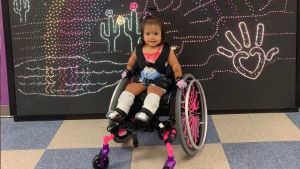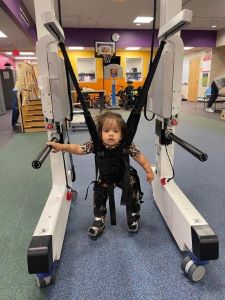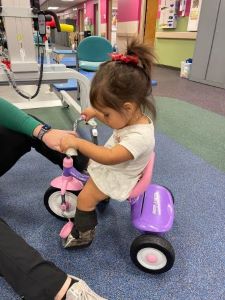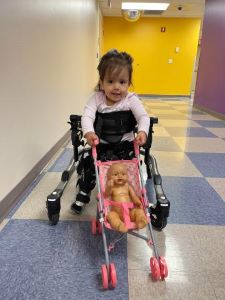- Center for Fetal and Neonatal Care
- Physical Therapy
- Barrow Neurological Institute at Phoenix Children's
- Neonatal Intensive Care Unit (NICU)
- Spina Bifida Clinic

Meet Emy. She was a fighter before she was even born. At two years old, Emy works harder than most kids – and maybe even some adults! For more than half her life, she’s spent countless hours in therapy learning how to do things that most people take for granted.
That’s because Emy was born with spina bifida, a congenital birth defect that affects the lower spine, and hydrocephalus. Diagnosed at just 20 weeks gestation, Emy had fetal surgery for her spina bifida five weeks later. Emy was then born on her scheduled due date before spending almost six weeks in the NICU.
At the time, Emy’s family lived in New Mexico, and they were searching for pediatric specialists who could manage her medical complexities and help Emy thrive. When they found the team at Phoenix Children’s, Emy and her parents moved to Arizona so she could have the comprehensive team of pediatric experts she needed.
“Right away, we noticed that the doctors at Phoenix Children’s really listened,” says Jessica Sanchez, Emy’s mom. “To feel like you’ll be heard is so important; it helped us feel able to advocate for Emy.”
Physical Therapy Allows Emy to Play

After multiple surgeries and appointments with doctors in the Spina Bifida Clinic and Barrow Neurological Institute at Phoenix Children's, Emy is now a rehab superstar! She has physical therapy twice a week and occupational therapy once a week.
“Emy is always excited to see her therapists,” says Jessica. “She works twice as hard for things that come ‘naturally’ to other kids, and you’ll never see her giving up. She makes us so proud.”
The Phoenix Children’s physical therapy team employs a child-led model. That means they let Emy take the lead, using what she is most interested in to maximize therapy sessions. These days, Emy loves to push things like her doll stroller and a toy grocery cart. Since her therapists are working with her on standing and learning to walk, they can use Emy’s favorite toys to motivate her during therapy.
“Right now, we are focused on achieving the right combination of mobility and stability for Emy through leg braces and physical therapy,” explains Cindy Kerr, physical therapist. “While Emy might always need a wheelchair for longer distances, we want to help her be as independent as possible. And standing has great benefits for her digestion and bone density too.”

Emy has made a lot of progress since she started physical therapy more than one year ago. “When she started, we were working on balance for sitting,” says Sara Cherepinsky, outpatient physical therapy assistant. “Now she is in gait trainers working on walking. It’s so rewarding to see her determination and progress.”
Pediatric physical therapy can be a bit of a rollercoaster, with periods of great progress and plateaus. Sara reminds parents that it is okay to take breaks from time to time – in fact, time off can be beneficial. “Recently, we could tell that Emy was burnt out and needed a little break … some time off to just be a kiddo,” explains Sara. “Now she’s back, and we are seeing more progress than ever.”
Both Cindy and Sara are quick to point out that no one knows what Emy will or will not be able to do in the future. With spina bifida patients, caregivers look at the level of the spine impacted and what affect it has on the surrounding muscles. Then the goal is to treat every child as a whole – a person who needs support to use what they have to become as independent as possible.
“Emy is a very motivated little girl,” adds Cindy. “I see really great things for her in the future.”
Hope for the Future

Jessica is also optimistic about Emy’s future and is dedicated to sharing that hope with other parents receiving a spina bifida diagnosis for their unborn children. “Our kids are living testaments that you can have a happy, fulfilling life with a disability. That’s what I want expecting parents to know and for others to know as well,” says Jessica.
Since Emy was born, Jessica has found it important to surround their family with community – and to provide it to others. She offers this advice to parents who may be starting this journey:
- Join support groups. There are many online, especially on Facebook. Post questions, and ask for help when you need it.
- Prioritize your mental health. “You have to process the grief, and get yourself better so you can take care of your child,” explains Jessica.
- Celebrate your baby’s upcoming arrival. Try not to let the joy of expecting a new baby get overshadowed by this diagnosis. If you are a friend or family member of the parents, congratulate them on their new baby, and try to help them celebrate the pregnancy, especially since it is full of unknowns.
- Remember, your baby is amazing. No matter the lesion level, no matter the type of spina bifida, no matter whether you choose in utero repair or postnatal repair, your child is going to be amazing and surprise you in so many ways.

“I remember once telling myself that if I had known when I was pregnant what life would be like with Emy right now, I would have worried less because she truly lives a beautiful life,” adds Jessica. “Being a parent of a special needs child is something you never dream of, but once you are one, you appreciate everything a little more.”
To learn more about Phoenix Children’s Spina Bifida Clinic, click here.
